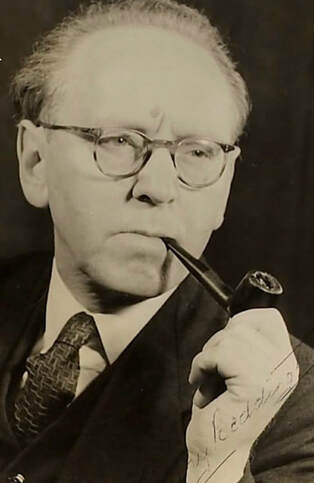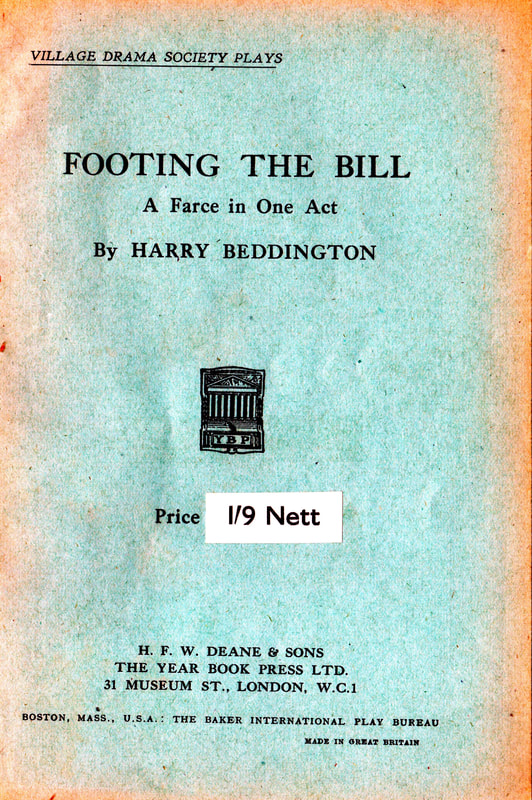|
Cinderford author Harry Beddington became a much loved commentator on Forest life through his pieces in the local newspaper, and his books Forest of Dean Humour (1961) and Forest Acorns (1963) – both books coming together in Forest Humour (1977). He reached an even wider audience with appearances on television and radio, and with his contribution to the vinyl album Forest Talk (1981). He was a talented artist, performer and poet, and now research is beginning to reveal that Harry was a talented playwright too. His first ever publication was actually a play, Footing the Bill, in 1946 for the Village Drama Society. The one-act farce, all in Forest dialect, won first prize at the Gloucestershire Music and Drama Festival finals at Cheltenham Town Hall in 1944. The play was put on by Cinderford’s MINTEC Players (so called after the Mining & Technical College) with Harry and his wife Mildred making up two of the four cast. The play was described at the time in the Dean Forest Mercury as, ‘true native comedy at its best’[1], and Mr Leo Baker, the county drama adviser (who had already seen the play in the qualifying rounds) said that:
‘when he saw it at Cinderford he could not understand much of it, but the audience rocked in their seats all the time. If the Cheltenham audience were mystified by “thee bist” or wondered what a “butty” was they also were convulsed and gave the players the biggest applause of the evening’[2] It’s said by Harry’s family that he got involved in the local drama scene (as producer, actor, and then playwright) because of his wife Mildred’s love of acting. She’d become involved in amateur drama with the Bilson W.I. and appeared in their production of No Servants in 1939[3] (a one-act play by Gertrude E. Jennings). The play was performed at the Forest of Dean W.I. Drama Festival held at the Miners Welfare Hall in Cinderford, and was described by adjudicator Miss Isabel Chisman of Bath as, ‘good entertainment; very slick; very light,’ but, ‘not a good choice for the festivals’. Mitcheldean W.I.’s performance of Many Ways was awarded best play at that competition. This was all part of what was a lively local drama scene. Mary Kelly in Devon had founded the Village Drama Society in 1918 and it quickly grew into a movement that encouraged groups to set up in other areas, with Mary regularly a guest speaker at Women’s Institutes around the country[4]. There was clearly interest in Gloucestershire with the society’s annual general meetings reported in some detail in the Gloucester Journal as early as 1922[5], with its president (the author and critic Sir Arthur Quiller-Couch) reminding those attending that they should value, rather than criticise, the local dialects in their performers. The British Drama League[6] too had been formed in 1919 its aim being to support the rebuilding of British theatre after the war, and by its second year it was making links with Britain’s Women’s Institutes and judging their drama competitions. The Forest was no exception to this rural drama renaissance, and in 1937 was part of Gloucestershire’s Village Drama Festival supported by the Rural Community Council, with events at Longhope and Lydbrook[7]. At Lydbrook teams competing included those from Cinderford (the Deancroft Players, and Cinderford Dramatic Society) and Berry Hill. In 1944 Harry’s comedy, Footing the Bill, was just one of many competing across the Forest for a place in the finals with the qualifying round at Cinderford’s East Dean Grammar School featuring teams from Ruardean and Mitcheldean[8]. As far as Cinderford was concerned the Dean Forest Mercury ascribed much of the revival in drama to Mr Aveston of the grammar school. Following the success of Footing the Bill and it’s publication, Harry went on to write several more plays, as well as producing and performing. In 1950, to much acclaim, he appeared in (as well as co-producing) MINTEC Players’ production of Eden Phillpotts’ Devonshire Cream, Harry taking the role of Billy Blee: ‘This was a fine part with many pithy lines and Mr Beddington played it with obvious assurance and enjoyment, whether he was taking centre stage ridiculing women folk or lawyers or being pushed to one side protesting by his employer, Elias Widecombe’[9] Only a month later, in December, his own next comedy play, Talking Turkey, described as a ‘topical comedy,’ was on at The Miners Hall in Cinderford. Put on by the Bilson W.I. drama group Harry took the part of the spiv [10]. More plays were to come. Limbo, in 1959, was a thriller in three acts inspired by a Littledean Hall ghost story, performed by the MINTEC Players at East Dean Grammar School. Another play of the period, Homespun, drew on Harry’s own experience during World War Two working in local civil defence. The play, that features a great deal of Forest dialect, is set amongst a Forest Homeguard unit. Harry’s family remember him telling them that he sent the script to the BBC but it was turned down. Not long afterwards Dad’s Army appeared on TV and Harry often wondered if his play had inspired it’s commissioning. Harry was a prolific writer, who had a real passion for writing for the stage. Certainly his wife Mildred and her friends in the W.I. seem to have been an inspiration, but also the connection he had with schools through his job in local government education administration. Harry’s plays were embedded in the rich local amateur drama scene, and drew for their themes on his own experiences, as well as the rich culture, people, and history in the Forest. Research into all aspects of Harry’s work continues and we hope to be able to share a great deal more soon. In the meantime, the seventy fifth anniversary of that prize-winning performance of Footing the Bill is being marked with a revival performance on July 21st 2019 – more details here. Jason Griffiths Sources [1] Dean Forest Mercury (1944) Hit of the evening but…, Dean Forest Mercury, 5th May, p5f. [2] Dean Forest Mercury (1944) Drama Festival: Cinderford Teams Compete, Dean Forest Mercury, 21st April, p5e. [3] The Citizen (1939) Forest Drama Festival: Mitcheldean Win Shield: Record Audience, The Citizen, 10th March, p11c. [4] Wallis, M. (2004) Kelly, Mary Elfreda. Oxford Dictionary of National Biography [online] Avialable at: https://www.oxforddnb.com/view/10.1093/ref:odnb/9780198614128.001.0001/odnb-9780198614128-e-69833?rskey=gn7Wr1&result=1 [Accessed July 9th 2019] [5] Gloucester Journal (1922) A Merrier England: Sir Arthur Quiller-Couch and Village Drama, Gloucester Journal, 16th December, p2e. [6] British Drama League (1944) Twentyfive Years of the British Drama League MCMXIX-MCMXLIV (Facsimile of booklet produced to commemorate twenty-fifth anniversary, 1944) [online] Available at: http://www.allenglandtheatrefestival.co.uk/index_htm_files/hist25.pdf [Accessed 9th July 2019] [7] Gloucester Journal (1937) Forest Drama Festival, Gloucester Journal, 6th March, p17d. [8] Gloucester Journal (1944) Drama Festival in Dean Forest: Mining School Gain Highest Marks, Gloucester Journal, p8c. [9] Dean, H (1950) Heather Dean’s Column: Devonshire Cream, Gloucester Journal, 25th November, p6b. [10] The Citizen (1950) Bilson: Record Turn-out, The Citizen, 19th December, p2b.
2 Comments
|
Archives
June 2024
|


 RSS Feed
RSS Feed


